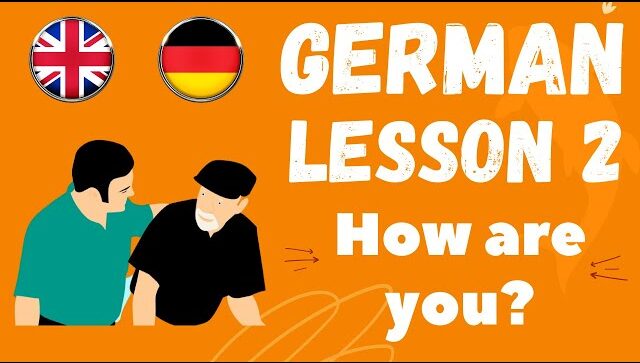When embarking on the journey of learning a new language, the simple act of greeting and asking someone how they are can open doors to deeper understanding and connections. German, with its precision and richness, offers a variety of ways to inquire about someone’s well-being. This blog delves into the nuances of asking “How are you?” in German, ensuring you’re equipped for polite conversation, whether you’re strolling through the streets of Berlin or navigating a professional setting in Munich.
The Basics: “Wie geht es Ihnen?” and “Wie geht es dir?”
At the heart of German greetings are the phrases “Wie geht es Ihnen?” and “Wie geht es dir?” The former is the formal way to say “How Are You in german language” used when addressing someone you don’t know well, someone older, or in a professional context. “Ihnen” is the formal “you” in German. The latter, “Wie geht es dir?” is used in informal settings, such as with friends, family, or people your age.
Understanding the Formal and Informal
Formal Greetings
In a professional environment or when meeting someone for the first time, it’s crucial to lean towards formal language. “Guten Tag, wie geht es Ihnen?” translates to “Good day, how are you?” This not only conveys respect but also sets a polite tone for the conversation.
Informal Greetings
With friends or acquaintances, the language becomes more relaxed. “Hallo, wie geht es dir?” means “Hello, how are you?” It’s a casual way to show concern for the person’s well-being.
Variations and Responses
Variations
- “Wie geht’s?” is a more casual and commonly used version of “Wie geht es dir?” It’s akin to saying “How’s it going?” in English.
- “Wie steht’s?” is another informal variant, similar to “What’s up?” though not used as frequently.
Responses
- “Mir geht es gut, danke. Und dir/Ihnen?” This means “I am doing well, thank you. And you?” Adjust “dir” or “Ihnen” based on the formality of your conversation.
- “Es geht mir nicht so gut,” meaning “I am not doing so well,” is a way to express that you’re feeling less than great. Honesty in response is appreciated in German culture, but it’s also common to keep responses relatively positive in formal settings.
Beyond “How are You?” – Other Forms of Inquiry
To show interest in someone’s life or well-being, you might venture beyond the basic “How are you?” Here are a few examples:
- “Was macht die Arbeit?” (“How’s work going?”)
- “Wie läuft das Studium?” (“How’s your study going?”)
- “Wie war dein Tag?” (“How was your day?”) – for more informal contexts.
Cultural Nuances
Understanding the cultural context is as important as mastering the language itself. Germans are known for their directness and honesty. When asked “Wie geht es Ihnen/dir?” don’t be surprised by a detailed response; it’s part of the culture. Similarly, when you ask the question, be prepared to listen.
Practicing Your Skills
Language is a bridge to understanding a culture, and practicing is key. Try these tips:
- Engage with language exchange partners.
- Listen to German podcasts or watch German films to hear the phrases in context.
- Practice with language learning apps that provide real-life conversation simulations.
Conclusion
Asking How Are You in german language? in German might seem like a simple task, but the cultural richness behind this basic interaction is vast. Whether you’re engaging in a formal or informal conversation, the ability to inquire about someone’s well-being in their native language is a sign of respect and interest. By understanding the nuances of these greetings, you’re not just learning phrases; you’re unlocking doors to meaningful connections and a deeper understanding of German culture.
Remember, language learning is a journey filled with small victories and learning moments. Each conversation, whether it’s a flawless exchange or an opportunity to learn from mistakes, is a step forward in your linguistic adventure. So, the next time you find yourself amidst a German-speaking crowd, go ahead and ask, “Wie geht es Ihnen?” Your interest and effort are the first steps towards building bridges of communication and friendship.

